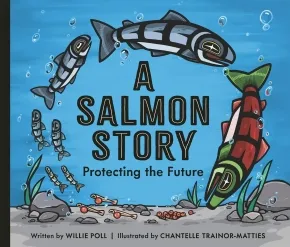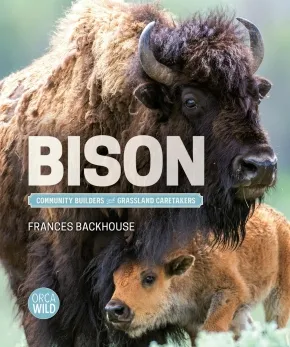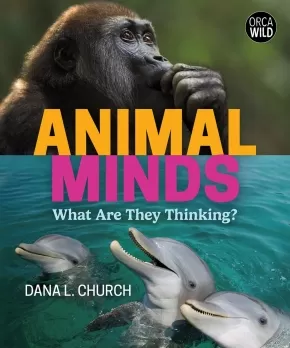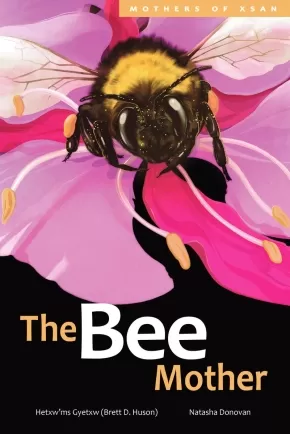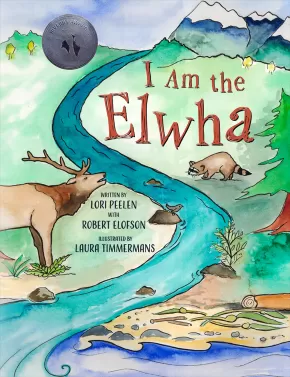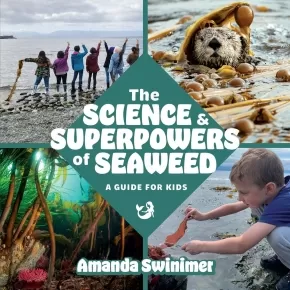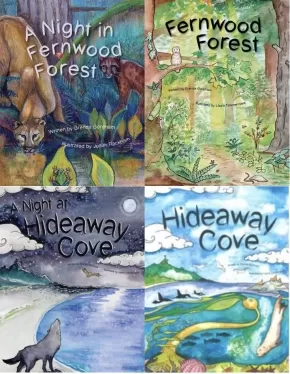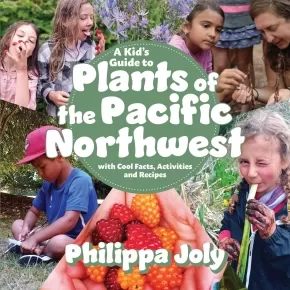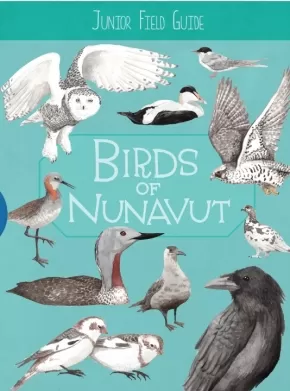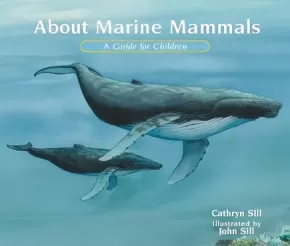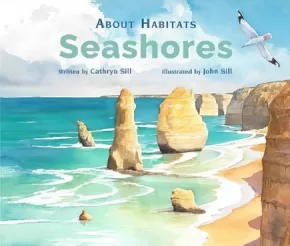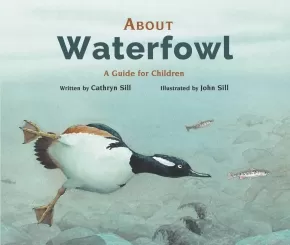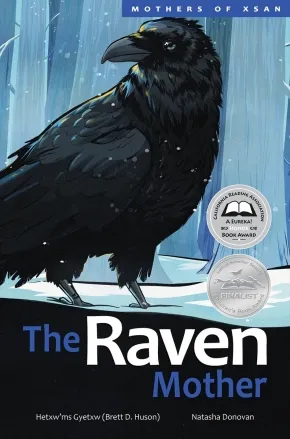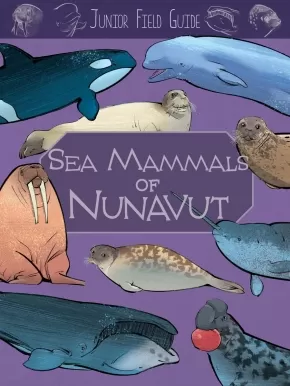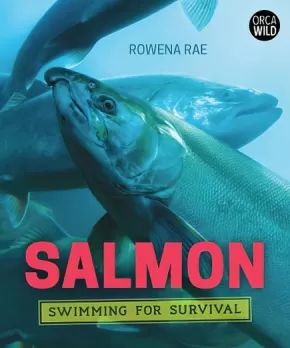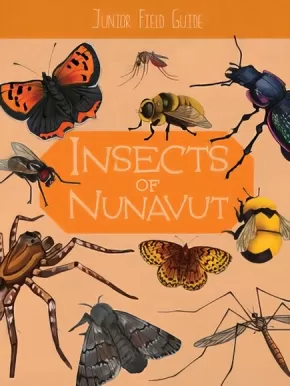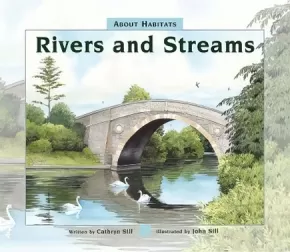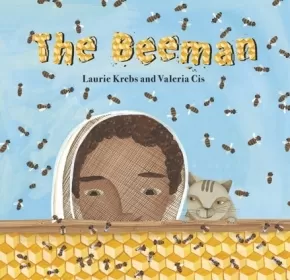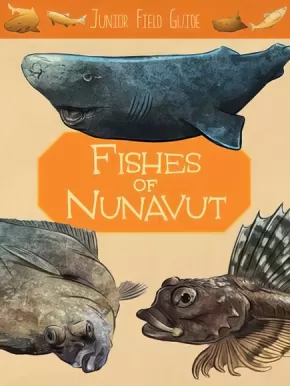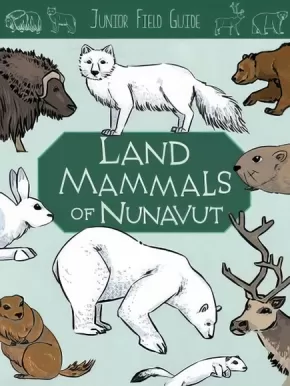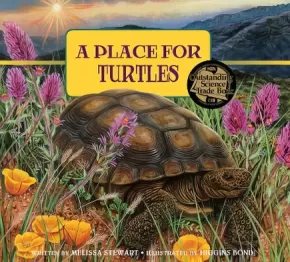
Ecosystem
1
-
15
of
92 Results;
Sort By
Go To
of 7
A Salmon Story: Protecting the Future
$22.95
Artists:
Format:
Hardcover
Text Content Territories:
Indigenous Canadian; First Nations; Salish; Interior Salish; St'at'imc (Lillooet, Lil'Wat);
ISBN / Barcode: 9781771476461
Synopsis:
Synopsis:
A lyrical informational picture book about how open-net pen fish farms impact wild salmon and their ecosystems
Salmon are central to their ecosystem and the lives of many Indigenous Nations, but the rapid rise of open net-pen fish farming has threatened these longstanding connections. Salmon have followed the same migration routes for thousands of years, but the fish farming industry has had a deadly impact on their annual journey. Open-net pen farms release harmful waste into the ocean that is lethal to the wild salmon forced to swim through it. Now, the salmon must battle against the human-made destruction of their habitat, and many Nations are advocating for change and creating calls of action to protect salmon for future generations.
As the young salmon journey from their gravel nests to the open ocean, readers learn about the life cycle of wild salmon, the effects of open-net pen fish farms, and the role of salmon as a keystone species.
Boldly illustrated with gorgeous Northwest Coast formline art, rhythmic poetry combines with supportive nonfiction content to illuminate the struggles faced by wild salmon populations.
Educator Information
Recommended for ages 5 to 8.
Fountas & Pinnell Text Level Gradient: J
Lexile measure: 980L
Additional Information
40 pages | 10.00" x 8.50" | Hardcover
The Cedar Mother
$24.95
Artists:
Format:
Hardcover
Text Content Territories:
Indigenous Canadian; First Nations; Gitxsan (Gitksan);
ISBN / Barcode: 9781774921586
Synopsis:
Synopsis:
From small sapling to towering giant, follow the long life of a cedar tree in this illustrated book for young scientists.
Step outside to explore the hidden mysteries of the cedar tree life cycle in this beautifully illustrated, engaging non-fiction book for young scientists ages 9 to 12.
Meet Nox Sim Gan, the cedar mother, whose life cycle spans centuries and whose roots anchor the landscape. The cedar mother plays a vital role in the ecosystem: offering shelter for birds in her strong limbs, providing refuge for small creatures beneath her bark, and healing the Gitxsan with a medicinal tea made from her soft, green leaves. She also creates the very oxygen that all land-dwelling creatures need to breathe.
Delve into the remarkable story of the western red cedar as you learn how she nourishes herself through an unexpected connection to salmon, the secret web of life that thrives beneath the ground, and how, at the end of her life, she leaves a final gift for the Gitxsan. This book invites young readers to discover the life of a tree that is much more than meets the eye, offering lessons in interconnectedness, and in wisdom passed down through generations.
Educator & Series Information
Recommended for ages 9 to 12.
Lexile measure: 1050L
This book is part of the Mother of Xsan series, which uses striking illustration and lyrical language to bring the poetry of the Xsan ecosystem to life. It is the eighth book in the series.
Additional Information
32 pages | 6.50" x 10.00" | Hardcover
A Kid's Guide to Plants of the Great Lakes Region: Including Southern Ontario with Cool Facts, Activities and Recipes
$26.95
Format:
Paperback
Text Content Territories:
Indigenous Canadian;
ISBN / Barcode: 9781998526109
Synopsis:
Synopsis:
A middle-grade-friendly introduction to flora of the Great Lakes Region, with outdoor activities, games and quizzes that make learning about nature fun! Great for families and educators.
Get dirty digging up roots. Crouch down to look closely at a carnivorous sundew dissolving a dragonfly. Make an elderberry concoction. Test your plant ID skills with a winter twig quiz. Make a soothing plantain salve to treat an itch. Learn which berries you can eat and which to avoid.
Time spent outdoors encourages children’s self-confidence and independence, increases attention span and physical well-being, and fosters care for the environment. With the increasing intrusion of technology into daily life, and the challenges of climate chaos, it has never been more essential for parents and educators to encourage kids to engage with the natural environment. Plants are everywhere, even in urban areas where parks, empty lots and backyards offer the opportunity to learn from and connect to nature.
Drawing on their years of experience as outdoor educators, co-authors Philippa Joly and Danielle Gehl Hagel feature fifty richly illustrated plant profiles, including information on identification and ecology, cultural uses, and fun activities—all in a way that is accessible and interesting to readers of all ages.
Educator Information
Juvenile Nonfiction.
Additional Information
224 pages | 8.50" x 8.50" | Paperback
Bison: Community Builders and Grassland Caretakers
$24.95
Format:
Hardcover
Text Content Territories:
Indigenous American; Indigenous Canadian; First Nations; Assiniboine (Nakoda Oyadebi); Carry The Kettle Nakoda First Nation; Métis;
ISBN / Barcode: 9781459839236
Synopsis:
Synopsis:
Bison are North America’s largest land animals.
Some 170,000 wood bison once roamed northern regions, while at least 30 million plains bison trekked across the rest of the continent. Almost driven to extinction in the 1800s by decades of slaughter and hunting, this ecological and cultural keystone species supports biodiversity and strengthens the ecosystems around it. Bison: Community Builders and Grassland Caretakers celebrates the traditions and teachings of Indigenous Peoples and looks at how bison lovers of all backgrounds came together to save these iconic animals. Learn about the places where bison are regaining a hoof-hold and meet some of the young people who are welcoming bison back home.
Educator & Series Information
Recommended for ages 9 to 12.
This book is part of the Orca Wild series that examines the intricacies of animals, ecosystems, humans and our relationships to each other.
This STEAM title examines the biology and habitat of bison, their role as a keystone species, their importance to Indigenous cultures, conservation efforts, and how kids can take action to protect bison in the future.
Reading Levels:
Fountas & Pinnell Text Level Gradient: W
Lexile measure: 1020L
Guided Reading Level: W
Contains some Indigenous content, such as a contribution from Kaleya Blackbird Runns from the Carry the Kettle Nakoda Nation in Saskatchewan, as well as information on the bison's importance to many Indigenous cultures in North America.
Additional Information
96 pages | 7.50" x 9.00" | 96 colour photographs, 2 maps, 1 index, 1 bibliography | Hardcover
When a Tree Falls: Nurse Logs and Their Incredible Forest Power
$28.99
Artists:
Format:
Hardcover
ISBN / Barcode: 9781797218670
Synopsis:
Synopsis:
The perfect read for exploring nature with children, this beautiful nonfiction picture book offers an awe-inspiring look at the forest’s life cycle.
A tree suns and sways in the forest. She is a place to grow, to rest, and to shelter. But what happens when a tree falls? The answer will make your heart soar. In this lyrical picture book, explore how the extraordinary nurse log provides a nutrient-rich space for new seedlings, shelters small animals, hosts different plant species, and, most profoundly, nurtures a new tree in the process, renewing the cycle of life. Young readers will be amazed by the nurse log’s resilience and its powerful connection to the forest’s past, present, and future.
Perfect for:
- Kids who are interested in trees and forests
- Parents and grandparents of children who want to learn more about trees and forests
- Teachers, educators, and librarians seeking beautiful nonfiction books with STEM content
- Gift-givers looking for a distinctive present for an animal- or nature-loving child
- Anyone seeking a picture book that promotes environmental awareness
Educator Information
Recommended for ages 6 to 9.
Every organism in the forest ecosystem is connected. This fascinating picture book powerfully illustrates how the end of one life in the forest can be the beginning of another.
When a Tree Falls is a reminder of the wondrous ecosystems in our own backyards and the wild forest beauty we may discover by looking closely. It is ideal for families who enjoy being in nature.
The forest life is rendered with such richness and detail that it invites readers to immerse themselves in the endlessly inspiring natural world.
An excellent choice for a classroom book or as a gift for kids who love trees, spending time outdoors, and are mindful of environmental issues.
Additional Informationb
Animal Minds: What Are They Thinking?
$24.95
Format:
Hardcover
ISBN / Barcode: 9781459834156
Synopsis:
Synopsis:
A deep dive into the minds of animals and how they think.
Wouldn't it be amazing to see inside the mind of a lion, a gorilla, an octopus or even a bee? In Animal Minds: What Are They Thinking?, author Dana L. Church looks at how scientists are doing just that. Their research shows that a wide variety of species have unique personalities, impressive memories, counting abilities, and incredible problem-solving skills.
Meet the scientists who study the minds of animals, discover the similarities and differences between the minds of different species and learn how they compare to our own. From dolphins to dung beetles, tigers to turkey vultures, Animal Minds shows that we are only beginning to scratch the surface when it comes to revealing the amazing inner worlds of the thousands of different creatures with whom we share this planet.
Reviews
“The book includes questions and answers with women scientists in the field, sidebars, and eye-catching full-page color photos. A good starting book on animal cognition for any young animal lover who has wondered if animals are more like humans than we think.”— Booklist
“Full-colour photos and illustrations are well-chosen and positioned to enhance understanding…Young readers…will find Animal Minds: What Are They Thinking? intriguing. It might help fill [a] knowledge gap and offer inspiration for further investigation. Highly recommended.”— CM: Canadian Review of Materials
Educator & Series Information
Recommended for ages 9 to 12.
This book is part of the Orca Wild series that examines the intricacies of animals, ecosystems, humans and our relationships to each other.
Additional Information
96 pages | 7.50" x 9.00" | Hardcover
The Bee Mother
$24.95
Artists:
Format:
Hardcover
Text Content Territories:
Indigenous Canadian; First Nations; Gitxsan (Gitksan);
ISBN / Barcode: 9781774920800
Synopsis:
Synopsis:
Discover the important role of bumblebees, honeybees, and wasps as pollinators in this colourful picture book for young scientists.
Learn about the life cycles of different kinds of bees in this enlightening picture book.
As flowers and trees begin to bud and bloom, Nox Ap, the bee mother, emerges from her winter sleep. To the Gitxsan, she is nature’s gardener. Without her hard work as a pollinator, we could not enjoy the fruits of strawberries and huckleberries. Follow her life from the first thaw of spring to the end of autumn.
In the seventh book of Hetxw'ms Gyetxw (Brett D. Huson)’s Mothers of Xsan series, readers will discover the important role of the bumblebee, the honeybee, and the yellow jacket wasp in the Xsan ecosystem.
Reviews
“Described with delicious adjectives (“pillowy moss floor”) that enrich the story...lushly colored and detailed; the fur on the bumblebee looks ready to be brushed. This great blend of nonfiction with narrative and amazing illustrations will engage readers in the life of bees and their significance to the Gitxsan Nation. A solid general purchase.” — School Library Journal
Educator & Series Information
Recommended for ages 9 to 12.
This book is part of the Mother of Xsan series, which uses striking illustration and lyrical language to bring the poetry of the Xsan ecosystem to life. It is the seventh book in the series.
Reading Level: Fountas & Pinnell T
Lexile® Framework for Reading: 1140L
Recommended in the Indigenous Books for Schools catalogue as a valuable resource for English Language Arts and Science in grades 2 to 6.
Themes: Animals, Land, Language, Sustainability, Life Cycles, Biodiversity, Interdependence, Seasons
Additional Information
32 pages | 6.50" x 10.00" | Hardcover
I Am the Elwha (PB)
 $14.95
$14.95

Artists:
Format:
Paperback
Text Content Territories:
Indigenous American; Native American; Salish; Coast Salish; Klallam (Clallam); Lower Elwha Klallam Tribe;
ISBN / Barcode: 9781771746311
Synopsis:
Synopsis:
"I am the Elwha, rushing down to the sea. I am the Elwha, wild and free."
The Elwha River flows 72km (45 miles) from its source in the Olympic Mountains to the Strait of Juan de Fuca in the Pacific Northwest. Uniquely, it hosts all six salmon species (Pink, Chinook, Coho, Sockeye, Steelhead, and Chum) as well as several species of trout.
In 1911, two dams were built on the river. The dams blocked the migration routes of the salmon and dramatically altered the entire river ecosystem for 100 years. In 2012, the dams were decommissioned and the world's largest dam removal and habitat restoration project began. In this lyrical and beautifully illustrated book, the author chronicles the history of the Elwha.
Narrated by the powerful voices of plants and animals that inhabit the river ecosystem, the dam builder, a worker, members of the Klallam Tribe, and the river itself, this story celebrates the ongoing rewilding of this special environment and offers a welcome to all the creatures who are coming home.
To learn more visit: www.elwha.org
Awards
- 2021 Riverby Award for Young Readers
Reviews
“I Am the Elwha is a powerful read about a powerful river and those who value and protect it." – Raina Delisle, Hakai Magazine
Educator Information
Recommended for grades 3 to 7.
At the back of the book are three pages of cultural, scientific, and historical information that discuss the following:
- the importance and symbolism of salmon to the Lower Elwha Klallam Tribe and other Coastal Salish Tribes
- facts about the six species of salmon found in the Elwha River (Chinook, Pink, Chum, Sockeye, Coho, and Steelhead)
- the history of the Elwha River and its status today
Keywords / Subjects: The Elwha River, Rivers, Dams, History, Environmental Awareness, Lower Elwha Klallam Tribe, Coast Salish, Native American, Culture, Washington, Animals, Salmon, First Salmon Ceremony, Plants, Nature, Settlers, Social Responsibility, Environmental Activism, Poetry.
Additional Information
32 Pages | 8.5" x 11" | ISBN: 9781771746311 | Second Edition | Paperback
Authenticity Note: This lyrical story, which chronicles the history of the Elwha River, is written by Lori Peelen. Robert Elofson, Tribal Elder and Harvest Manager in the Natural Resources Department for the Lower Elwha Klallam Tribes, approved Lori's work and contributed pages of back matter at the end of the work. Lori's story was further approved by Frances Charles, the Tribal Councilwoman for the Lower Elwha Klallam Tribe, after the entire council read and approved it.
The Canadian Content label has been applied because the illustrator of this work is Canadian.
The Science and Superpowers of Seaweed: A Guide for Kids
$24.95
Format:
Paperback
ISBN / Barcode: 9781990776199
Synopsis:
Synopsis:
A middle-grade and family-friendly introduction to the enchanting world of seaweed.
Young readers will be delighted to learn about the wonderful, watery world of seaweed, where emerald-green kelp forests grow as tall as trees and rainbow seaweeds shimmer like gemstones in the sunlight. Seaweed can be fun too, providing tasty snacks like nori crisps and cool things to do: hunt for dead man’s fingers to squeeze like a squirt gun, have a popping contest with rockweed or make seaweed art. Seaweeds are also critical to the health of the planet—they produce most of the oxygen we need to breathe, help to keep the earth cool and provide habitat for sea creatures. And they're full of healthy vitamins and have more minerals than any other food!
This colourful, activity-packed book explores the science of seaweed while showing how to sustainably harvest and use it, and providing many fun facts about marine plants and animals. It is a unique field guide, featuring seaweeds from both Atlantic and Pacific oceans and showcasing the beautiful and vital ecosystems of the coasts, and is sure to inspire curious beachcombers of all ages.
Educator Information
Recommended for ages 6 to 12.
Additional Information
168 pages | 8.50" x 8.50" | Paperback
Strong Science - Animals: All About Raccoons
 $7.50
$7.50

Format:
Paperback
Grade Levels: Kindergarten; 1;
ISBN / Barcode: 978-1-77174-619-9
Synopsis:
Synopsis:
This book is about raccoons.
Raccoons live where they can find food. Some live in forests. Others live in parks, in cities, or on farms.
What else do you know about raccoons?
Educator & Series Information
Recommended for grade 1 students, but may also be useful in kindergarten classrooms.
Strong Science - Animals is a language-based science series for primary students featuring animals that all Canadian students will recognize. Photographs and Indigenous artwork illustrate the series. Common learning objectives in science curricula across Canada are addressed, and suggestions for extending the learning to other curriculum areas, including Indigenous cultural awareness, language arts, math, and art, are included in the teacher’s guide. The sixteen books in this series are grouped into four levels that increase in complexity, designed to accommodate students with various reading abilities within a classroom. This feature facilitates the use of this series in literacy programs along with the Strong Readers series.
All About Raccoons is an EP4 (Early Primary 4) book in the Strong Science - Animals series. Font size decreases as language complexity and word count increase across levels: EP1 books have approximately 40 words, EP2 books have approximately 60 words, EP3 books have approximately 80 words, and EP4 books have approximately 100 words.
A teacher's guide for Strong Science - Animals is available: Strong Science - Animals: Teacher's Guide
Additional Information
16 Pages | 6.5" x 5.5" | Paperback | ISBN: 978-1-77174-619-9
Strong Science - Animals: All About Ducks
 $7.50
$7.50

Format:
Paperback
Grade Levels: Kindergarten; 1;
ISBN / Barcode: 978-1-77174-615-1
Synopsis:
Synopsis:
There are many kinds of ducks.
The ducks in this book are mallards.
Ducks can swim, walk, and fly.
What else do you know about ducks?
Educator & Series Information
Recommended for grade 1 students, but may also be useful in kindergarten classrooms.
Strong Science - Animals is a language-based science series for primary students featuring animals that all Canadian students will recognize. Photographs and Indigenous artwork illustrate the series. Common learning objectives in science curricula across Canada are addressed, and suggestions for extending the learning to other curriculum areas, including Indigenous cultural awareness, language arts, math, and art, are included in the teacher’s guide. The sixteen books in this series are grouped into four levels that increase in complexity, designed to accommodate students with various reading abilities within a classroom. This feature facilitates the use of this series in literacy programs along with the Strong Readers series.
All About Ducks is an EP4 (Early Primary 4) book in the Strong Science - Animals series. Font size decreases as language complexity and word count increase across levels: EP1 books have approximately 40 words, EP2 books have approximately 60 words, EP3 books have approximately 80 words, and EP4 books have approximately 100 words.
A teacher's guide for Strong Science - Animals is available: Strong Science - Animals: Teacher's Guide
Additional Information
16 Pages | 6.5" x 5.5" | Paperback | ISBN: 978-1-77174-615-1
Strong Science - Animals: All About Deer
 $7.50
$7.50

Format:
Paperback
Grade Levels: Kindergarten; 1;
ISBN / Barcode: 978-1-77174-614-4
Synopsis:
Synopsis:
There are many kinds of deer. The deer in this book are black-tailed deer.
Black-tailed deer have light brown coats in the summer. They grow thicker, darker coats in the winter.
Educator & Series Information
Recommended for grade 1 students, but may also be useful in kindergarten classrooms.
Strong Science - Animals is a language-based science series for primary students featuring animals that all Canadian students will recognize. Photographs and Indigenous artwork illustrate the series. Common learning objectives in science curricula across Canada are addressed, and suggestions for extending the learning to other curriculum areas, including Indigenous cultural awareness, language arts, math, and art, are included in the teacher’s guide. The sixteen books in this series are grouped into four levels that increase in complexity, designed to accommodate students with various reading abilities within a classroom. This feature facilitates the use of this series in literacy programs along with the Strong Readers series.
All About Deer is an EP4 (Early Primary 4) book in the Strong Science - Animals series. Font size decreases as language complexity and word count increase across levels: EP1 books have approximately 40 words, EP2 books have approximately 60 words, EP3 books have approximately 80 words, and EP4 books have approximately 100 words.
A teacher's guide for Strong Science - Animals is available: Strong Science - Animals: Teacher's Guide
Additional Information
16 Pages | 6.5" x 5.5" | Paperback | ISBN: 978-1-77174-614-4
Strong Science - Animals: All About Beavers
 $7.50
$7.50

Format:
Paperback
Grade Levels: Kindergarten; 1;
ISBN / Barcode: 978-1-77174-618-2
Synopsis:
Synopsis:
This book is about beavers.
Beavers have two layers of thick fur to keep them warm in the water. They have wide, flat tails. Their tails help them balance when they cut down trees.
What else do you know about beavers?
Educator & Series Information
Recommended for grade 1 students, but may also be useful in kindergarten classrooms.
Strong Science - Animals is a language-based science series for primary students featuring animals that all Canadian students will recognize. Photographs and Indigenous artwork illustrate the series. Common learning objectives in science curricula across Canada are addressed, and suggestions for extending the learning to other curriculum areas, including Indigenous cultural awareness, language arts, math, and art, are included in the teacher’s guide. The sixteen books in this series are grouped into four levels that increase in complexity, designed to accommodate students with various reading abilities within a classroom. This feature facilitates the use of this series in literacy programs along with the Strong Readers series.
All About Beavers is an EP4 (Early Primary 4) book in the Strong Science - Animals series. Font size decreases as language complexity and word count increase across levels: EP1 books have approximately 40 words, EP2 books have approximately 60 words, EP3 books have approximately 80 words, and EP4 books have approximately 100 words.
A teacher's guide for Strong Science - Animals is available: Strong Science - Animals: Teacher's Guide
Additional Information
16 Pages | 6.5" x 5.5" | Paperback | ISBN: 978-1-77174-618-2
Strong Science - Animals: The Ducks Fly Away
 $7.50
$7.50

Artists:
Format:
Paperback
Text Content Territories:
Indigenous Canadian;
Grade Levels: Kindergarten; 1;
ISBN / Barcode: 978-1-77174-617-5
Synopsis:
Synopsis:
This story begins with the ducks seeing the leaves on the trees turning red and yellow. How do you think this story ends?
There are four seasons in the year: winter, spring, summer, and fall. Which season is this story about?
Educator & Series Information
Recommended for grade 1 students, but may also be useful in kindergarten classrooms.
Strong Science - Animals is a language-based science series for primary students featuring animals that all Canadian students will recognize. Photographs and Indigenous artwork illustrate the series. Common learning objectives in science curricula across Canada are addressed, and suggestions for extending the learning to other curriculum areas, including Indigenous cultural awareness, language arts, math, and art, are included in the teacher’s guide. The sixteen books in this series are grouped into four levels that increase in complexity, designed to accommodate students with various reading abilities within a classroom. This feature facilitates the use of this series in literacy programs along with the Strong Readers series.
The Ducks Fly Away is an EP3 (Early Primary 3) book in the Strong Science - Animals series. Font size decreases as language complexity and word count increase across levels: EP1 books have approximately 40 words, EP2 books have approximately 60 words, EP3 books have approximately 80 words, and EP4 books have approximately 100 words.
A teacher's guide for Strong Science - Animals is available: Strong Science - Animals: Teacher's Guide
Authenticity Note: This book has received the Indigenous Text label because the author is Indigenous (Lakota) and the featured animal holds cultural significance in many Indigenous cultures. The engaging story provides factual information in an easy-to-read format for children to learn science concepts and build literacy skills. It promotes respect for animals and Mother Earth, and its illustrations communicate additional cultural information through Lakota symbolism and designs. Further cultural connections are identified in the teacher's guide. Refer to the guide to explore the book's Indigenous connections fully. It is up to readers to determine if the book will work as a stand-alone authentic Indigenous text for their purposes.
Additional Information
16 Pages | 6.5" x 5.5" | Paperback | ISBN: 978-1-77174-617-5
Strong Science - Animals: Mother and Baby Raccoons
 $7.50
$7.50

Artists:
Format:
Paperback
Text Content Territories:
Indigenous Canadian;
Grade Levels: Kindergarten; 1;
ISBN / Barcode: 978-1-77174-613-7
Synopsis:
Synopsis:
This story is about the home mother raccoon makes in a tree for her babies. The home is called a den.
There are four seasons in the year: winter, spring, summer, and fall. Which season is this story about?
Educator & Series Information
Recommended for grade 1 students, but may also be useful in kindergarten classrooms.
Strong Science - Animals is a language-based science series for primary students featuring animals that all Canadian students will recognize. Photographs and Indigenous artwork illustrate the series. Common learning objectives in science curricula across Canada are addressed, and suggestions for extending the learning to other curriculum areas, including Indigenous cultural awareness, language arts, math, and art, are included in the teacher’s guide. The sixteen books in this series are grouped into four levels that increase in complexity, designed to accommodate students with various reading abilities within a classroom. This feature facilitates the use of this series in literacy programs along with the Strong Readers series.
Mother and Baby Raccoons is an EP3 (Early Primary 3) book in the Strong Science - Animals series. Font size decreases as language complexity and word count increase across levels: EP1 books have approximately 40 words, EP2 books have approximately 60 words, EP3 books have approximately 80 words, and EP4 books have approximately 100 words.
A teacher's guide for Strong Science - Animals is available: Strong Science - Animals: Teacher's Guide
Authenticity Note: This book has received the Indigenous Text label because the author is Indigenous (Lakota) and the featured animal holds cultural significance in many Indigenous cultures. The engaging story provides factual information in an easy-to-read format for children to learn science concepts and build literacy skills. It promotes respect for animals and Mother Earth, and its illustrations communicate additional cultural information through Lakota symbolism and designs. Further cultural connections are identified in the teacher's guide. Refer to the guide to explore the book's Indigenous connections fully. It is up to readers to determine if the book will work as a stand-alone authentic Indigenous text for their purposes.
Additional Information
16 Pages | 6.5" x 5.5" | Paperback | ISBN: 978-1-77174-613-7
Strong Science - Animals: Deer in the Snow
 $7.50
$7.50

Artists:
Format:
Paperback
Text Content Territories:
Indigenous Canadian;
Grade Levels: Kindergarten; 1;
ISBN / Barcode: 978-1-77174-616-8
Synopsis:
Synopsis:
This story is about how deer find food when it snows.
There are four seasons in the year: winter, spring, summer, and fall. Which season is this story about?
Educator & Series Information
Recommended for grade 1 students, but may also be useful in kindergarten classrooms.
Strong Science - Animals is a language-based science series for primary students featuring animals that all Canadian students will recognize. Photographs and Indigenous artwork illustrate the series. Common learning objectives in science curricula across Canada are addressed, and suggestions for extending the learning to other curriculum areas, including Indigenous cultural awareness, language arts, math, and art, are included in the teacher’s guide. The sixteen books in this series are grouped into four levels that increase in complexity, designed to accommodate students with various reading abilities within a classroom. This feature facilitates the use of this series in literacy programs along with the Strong Readers series.
Deer in the Snow is an EP3 (Early Primary 3) book in the Strong Science - Animals series. Font size decreases as language complexity and word count increase across levels: EP1 books have approximately 40 words, EP2 books have approximately 60 words, EP3 books have approximately 80 words, and EP4 books have approximately 100 words.
A teacher's guide for Strong Science - Animals is available: Strong Science - Animals: Teacher's Guide
Authenticity Note: This book has received the Indigenous Text label because the author is Indigenous (Lakota) and the featured animal holds cultural significance in many Indigenous cultures. The engaging story provides factual information in an easy-to-read format for children to learn science concepts and build literacy skills. It promotes respect for animals and Mother Earth, and its illustrations communicate additional cultural information through Lakota symbolism and designs. Further cultural connections are identified in the teacher's guide. Refer to the guide to explore the book's Indigenous connections fully. It is up to readers to determine if the book will work as a stand-alone authentic Indigenous text for their purposes.
Additional Information
16 Pages | 6.5" x 5.5" | Paperback | ISBN: 978-1-77174-616-8
Strong Science - Animals: A Home for the Beavers
 $7.50
$7.50

Artists:
Format:
Paperback
Text Content Territories:
Indigenous Canadian;
Grade Levels: Kindergarten; 1;
ISBN / Barcode: 978-1-77174-612-0
Synopsis:
Synopsis:
This story is about a beaver home.
Beavers make homes out of sticks, rocks, and mud.
There are four seasons in the year: winter, spring, summer, and fall. Which season is this story about?
Educator & Series Information
Recommended for grade 1 students, but may also be useful in kindergarten classrooms.
Strong Science - Animals is a language-based science series for primary students featuring animals that all Canadian students will recognize. Photographs and Indigenous artwork illustrate the series. Common learning objectives in science curricula across Canada are addressed, and suggestions for extending the learning to other curriculum areas, including Indigenous cultural awareness, language arts, math, and art, are included in the teacher’s guide. The sixteen books in this series are grouped into four levels that increase in complexity, designed to accommodate students with various reading abilities within a classroom. This feature facilitates the use of this series in literacy programs along with the Strong Readers series.
A Home for the Beavers is an EP3 (Early Primary 3) book in the Strong Science - Animals series. Font size decreases as language complexity and word count increase across levels: EP1 books have approximately 40 words, EP2 books have approximately 60 words, EP3 books have approximately 80 words, and EP4 books have approximately 100 words.
A teacher's guide for Strong Science - Animals is available: Strong Science - Animals: Teacher's Guide
Authenticity Note: This book has received the Indigenous Text label because the author is Indigenous (Lakota) and the featured animal holds cultural significance in many Indigenous cultures. The engaging story provides factual information in an easy-to-read format for children to learn science concepts and build literacy skills. It promotes respect for animals and Mother Earth, and its illustrations communicate additional cultural information through Lakota symbolism and designs. Further cultural connections are identified in the teacher's guide. Refer to the guide to explore the book's Indigenous connections fully. It is up to readers to determine if the book will work as a stand-alone authentic Indigenous text for their purposes.
Additional Information
16 Pages | 6.5" x 5.5" | Paperback | ISBN: 978-1-77174-612-0
Strong Science - Animals: A Raccoon Family
 $7.50
$7.50

Format:
Paperback
Grade Levels: Kindergarten; 1;
ISBN / Barcode: 978-1-77174-611-3
Synopsis:
Synopsis:
This book is about a raccoon family.
Raccoon families live where they can find food.
Have you seen raccoons on a beach, in a city, or in a park?
Educator & Series Information
Recommended for grade 1 students, but may also be useful in kindergarten classrooms.
Strong Science - Animals is a language-based science series for primary students featuring animals that all Canadian students will recognize. Photographs and Indigenous artwork illustrate the series. Common learning objectives in science curricula across Canada are addressed, and suggestions for extending the learning to other curriculum areas, including Indigenous cultural awareness, language arts, math, and art, are included in the teacher’s guide. The sixteen books in this series are grouped into four levels that increase in complexity, designed to accommodate students with various reading abilities within a classroom. This feature facilitates the use of this series in literacy programs along with the Strong Readers series.
A Raccoon Family is an EP2 (Early Primary 2) book in the Strong Science - Animals series. Font size decreases as language complexity and word count increase across levels: EP1 books have approximately 40 words, EP2 books have approximately 60 words, EP3 books have approximately 80 words, and EP4 books have approximately 100 words.
A teacher's guide for Strong Science - Animals is available: Strong Science - Animals: Teacher's Guide
Additional Information
16 Pages | 6.5" x 5.5" | Paperback | ISBN: 978-1-77174-611-3
Strong Science - Animals: A Duck Family
 $7.50
$7.50

Format:
Paperback
Grade Levels: Kindergarten; 1;
ISBN / Barcode: 978-1-77174-610-6
Synopsis:
Synopsis:
This book is about a mallard duck family.
Mallards live near water.
Have you seen mallards in a marsh, pond, or lake?
Educator & Series Information
Recommended for grade 1 students, but may also be useful in kindergarten classrooms.
Strong Science - Animals is a language-based science series for primary students featuring animals that all Canadian students will recognize. Photographs and Indigenous artwork illustrate the series. Common learning objectives in science curricula across Canada are addressed, and suggestions for extending the learning to other curriculum areas, including Indigenous cultural awareness, language arts, math, and art, are included in the teacher’s guide. The sixteen books in this series are grouped into four levels that increase in complexity, designed to accommodate students with various reading abilities within a classroom. This feature facilitates the use of this series in literacy programs along with the Strong Readers series.
A Duck Family is an EP2 (Early Primary 2) book in the Strong Science - Animals series. Font size decreases as language complexity and word count increase across levels: EP1 books have approximately 40 words, EP2 books have approximately 60 words, EP3 books have approximately 80 words, and EP4 books have approximately 100 words.
A teacher's guide for Strong Science - Animals is available: Strong Science - Animals: Teacher's Guide
Additional Information
16 Pages | 6.5" x 5.5" | Paperback | ISBN: 978-1-77174-610-6
Strong Science - Animals: A Deer Family
 $7.50
$7.50

Format:
Paperback
Grade Levels: Kindergarten; 1;
ISBN / Barcode: 978-1-77174-607-6
Synopsis:
Synopsis:
This book is about a black-tailed deer family.
Black-tailed deer live at the edge of the forest.
Have you seen deer in a park, field, or forest?
Educator & Series Information
Recommended for grade 1 students, but may also be useful in kindergarten classrooms.
Strong Science - Animals is a language-based science series for primary students featuring animals that all Canadian students will recognize. Photographs and Indigenous artwork illustrate the series. Common learning objectives in science curricula across Canada are addressed, and suggestions for extending the learning to other curriculum areas, including Indigenous cultural awareness, language arts, math, and art, are included in the teacher’s guide. The sixteen books in this series are grouped into four levels that increase in complexity, designed to accommodate students with various reading abilities within a classroom. This feature facilitates the use of this series in literacy programs along with the Strong Readers series.
A Deer Family is an EP2 (Early Primary 2) book in the Strong Science - Animals series. Font size decreases as language complexity and word count increase across levels: EP1 books have approximately 40 words, EP2 books have approximately 60 words, EP3 books have approximately 80 words, and EP4 books have approximately 100 words.
A teacher's guide for Strong Science - Animals is available: Strong Science - Animals: Teacher's Guide
Additional Information
16 Pages | 6.5" x 5.5" | Paperback | ISBN: 978-1-77174-607-6
Strong Science - Animals: A Beaver Family
 $7.50
$7.50

Format:
Paperback
Grade Levels: Kindergarten; 1;
ISBN / Barcode: 978-1-77174-606-9
Synopsis:
Synopsis:
This book is about a beaver family.
Beavers work together to make their homes and to find food.
Have you seen beavers working in a lake, pond, or marsh?
Educator & Series Information
Recommended for grade 1 students, but may also be useful in kindergarten classrooms.
Strong Science - Animals is a language-based science series for primary students featuring animals that all Canadian students will recognize. Photographs and Indigenous artwork illustrate the series. Common learning objectives in science curricula across Canada are addressed, and suggestions for extending the learning to other curriculum areas, including Indigenous cultural awareness, language arts, math, and art, are included in the teacher’s guide. The sixteen books in this series are grouped into four levels that increase in complexity, designed to accommodate students with various reading abilities within a classroom. This feature facilitates the use of this series in literacy programs along with the Strong Readers series.
A Beaver Family is an EP2 (Early Primary 2) book in the Strong Science - Animals series. Font size decreases as language complexity and word count increase across levels: EP1 books have approximately 40 words, EP2 books have approximately 60 words, EP3 books have approximately 80 words, and EP4 books have approximately 100 words.
A teacher's guide for Strong Science - Animals is available: Strong Science - Animals: Teacher's Guide
Additional Information
16 Pages | 6.5" x 5.5" | Paperback | ISBN: 978-1-77174-606-9
Strong Science - Animals: Baby Deer
 $7.50
$7.50

Artists:
Format:
Paperback
Text Content Territories:
Indigenous Canadian;
Grade Levels: Kindergarten; 1;
ISBN / Barcode: 978-1-77174-608-3
Synopsis:
Synopsis:
This book is about a baby deer.
Baby deer can swim and jump.
Have you seen a baby deer? Where was it?
Educator & Series Information
Recommended for grade 1 students, but may also be useful in kindergarten classrooms.
Strong Science - Animals is a language-based science series for primary students featuring animals that all Canadian students will recognize. Photographs and Indigenous artwork illustrate the series. Common learning objectives in science curricula across Canada are addressed, and suggestions for extending the learning to other curriculum areas, including Indigenous cultural awareness, language arts, math, and art, are included in the teacher’s guide. The sixteen books in this series are grouped into four levels that increase in complexity, designed to accommodate students with various reading abilities within a classroom. This feature facilitates the use of this series in literacy programs along with the Strong Readers series.
Baby Duck is an EP1 (Early Primary 1) book in the Strong Science - Animals series. Font size decreases as language complexity and word count increase across levels: EP1 books have approximately 40 words, EP2 books have approximately 60 words, EP3 books have approximately 80 words, and EP4 books have approximately 100 words.
A teacher's guide for Strong Science - Animals is available: Strong Science - Animals: Teacher's Guide
Authenticity Note: This book has received the Indigenous Text label because the author is Indigenous (Lakota) and the featured animal holds cultural significance in many Indigenous cultures. The engaging story provides factual information in an easy-to-read format for children to learn science concepts and build literacy skills. It promotes respect for animals and Mother Earth, and its illustrations communicate additional cultural information through Lakota symbolism and designs. Further cultural connections are identified in the teacher's guide. Refer to the guide to explore the book's Indigenous connections fully. It is up to readers to determine if the book will work as a stand-alone authentic Indigenous text for their purposes.
Additional Information
16 Pages | 6.5" x 5.5" | Paperback | ISBN: 978-1-77174-608-3
Strong Science - Animals: Baby Raccoon
 $7.50
$7.50

Artists:
Format:
Paperback
Text Content Territories:
Indigenous Canadian;
Grade Levels: Kindergarten; 1;
ISBN / Barcode: 978-1-77174-605-2
Synopsis:
Synopsis:
This book is about a baby raccoon.
Raccoons can climb trees.
Why do you think raccoons climb trees?
Educator & Series Information
Recommended for grade 1 students, but may also be useful in kindergarten classrooms.
Strong Science - Animals is a language-based science series for primary students featuring animals that all Canadian students will recognize. Photographs and Indigenous artwork illustrate the series. Common learning objectives in science curricula across Canada are addressed, and suggestions for extending the learning to other curriculum areas, including Indigenous cultural awareness, language arts, math, and art, are included in the teacher’s guide. The sixteen books in this series are grouped into four levels that increase in complexity, designed to accommodate students with various reading abilities within a classroom. This feature facilitates the use of this series in literacy programs along with the Strong Readers series.
Baby Raccoon is an EP1 (Early Primary 1) book in the Strong Science - Animals series. Font size decreases as language complexity and word count increase across levels: EP1 books have approximately 40 words, EP2 books have approximately 60 words, EP3 books have approximately 80 words, and EP4 books have approximately 100 words.
A teacher's guide for Strong Science - Animals is available: Strong Science - Animals: Teacher's Guide
Authenticity Note: This book has received the Indigenous Text label because the author is Indigenous (Lakota) and the featured animal holds cultural significance in many Indigenous cultures. The engaging story provides factual information in an easy-to-read format for children to learn science concepts and build literacy skills. It promotes respect for animals and Mother Earth, and its illustrations communicate additional cultural information through Lakota symbolism and designs. Further cultural connections are identified in the teacher's guide. Refer to the guide to explore the book's Indigenous connections fully. It is up to readers to determine if the book will work as a stand-alone authentic Indigenous text for their purposes.
Additional Information
16 Pages | 6.5" x 5.5" | Paperback | ISBN: 978-1-77174-605-2
Strong Science - Animals: Baby Duck
 $7.50
$7.50

Artists:
Format:
Paperback
Text Content Territories:
Indigenous Canadian;
Grade Levels: Kindergarten; 1;
ISBN / Barcode: 978-1-77174-609-0
Synopsis:
Synopsis:
This book is about a baby duck.
Baby ducks come out of eggs.
Have you seen a baby duck? Where was it?
Educator & Series Information
Recommended for grade 1 students, but may also be useful in kindergarten classrooms.
Strong Science - Animals is a language-based science series for primary students featuring animals that all Canadian students will recognize. Photographs and Indigenous artwork illustrate the series. Common learning objectives in science curricula across Canada are addressed, and suggestions for extending the learning to other curriculum areas, including Indigenous cultural awareness, language arts, math, and art, are included in the teacher’s guide. The sixteen books in this series are grouped into four levels that increase in complexity, designed to accommodate students with various reading abilities within a classroom. This feature facilitates the use of this series in literacy programs along with the Strong Readers series.
Baby Duck is an EP1 (Early Primary 1) book in the Strong Science - Animals series. Font size decreases as language complexity and word count increase across levels: EP1 books have approximately 40 words, EP2 books have approximately 60 words, EP3 books have approximately 80 words, and EP4 books have approximately 100 words.
A teacher's guide for Strong Science - Animals is available: Strong Science - Animals: Teacher's Guide
Authenticity Note: This book has received the Indigenous Text label because the author is Indigenous (Lakota) and the featured animal holds cultural significance in many Indigenous cultures. The engaging story provides factual information in an easy-to-read format for children to learn science concepts and build literacy skills. It promotes respect for animals and Mother Earth, and its illustrations communicate additional cultural information through Lakota symbolism and designs. Further cultural connections are identified in the teacher's guide. Refer to the guide to explore the book's Indigenous connections fully. It is up to readers to determine if the book will work as a stand-alone authentic Indigenous text for their purposes.
Additional Information
16 Pages | 6.5" x 5.5" | Paperback | ISBN: 978-1-77174-609-0
Strong Science - Animals: Baby Beaver
 $7.50
$7.50

Artists:
Format:
Paperback
Text Content Territories:
Indigenous Canadian;
Grade Levels: Kindergarten; 1;
ISBN / Barcode: 978-1-77174-604-5
Synopsis:
Synopsis:
This book is about a baby beaver.
Beavers cut down trees.
Why do you think beavers cut down trees?
Educator & Series Information
Recommended for grade 1 students, but may also be useful in kindergarten classrooms.
Strong Science - Animals is a language-based science series for primary students featuring animals that all Canadian students will recognize. Photographs and Indigenous artwork illustrate the series. Common learning objectives in science curricula across Canada are addressed, and suggestions for extending the learning to other curriculum areas, including Indigenous cultural awareness, language arts, math, and art, are included in the teacher’s guide. The sixteen books in this series are grouped into four levels that increase in complexity, designed to accommodate students with various reading abilities within a classroom. This feature facilitates the use of this series in literacy programs along with the Strong Readers series.
Baby Beaver is an EP1 (Early Primary 1) book in the Strong Science - Animals series. Font size decreases as language complexity and word count increase across levels: EP1 books have approximately 40 words, EP2 books have approximately 60 words, EP3 books have approximately 80 words, and EP4 books have approximately 100 words.
A teacher's guide for Strong Science - Animals is available: Strong Science - Animals: Teacher's Guide
Authenticity Note: This book has received the Indigenous Text label because the author is Indigenous (Lakota) and the featured animal holds cultural significance in many Indigenous cultures. The engaging story provides factual information in an easy-to-read format for children to learn science concepts and build literacy skills. It promotes respect for animals and Mother Earth, and its illustrations communicate additional cultural information through Lakota symbolism and designs. Further cultural connections are identified in the teacher's guide. Refer to the guide to explore the book's Indigenous connections fully. It is up to readers to determine if the book will work as a stand-alone authentic Indigenous text for their purposes.
Additional Information
16 Pages | 6.5" x 5.5" | Paperback | ISBN: 978-1-77174-604-5
A Night in Fernwood Forest
 $21.95
$21.95

Artists:
Format:
Hardcover
ISBN / Barcode: 9781771746021
Synopsis:
Synopsis:
Come with us for a walk along a secluded forest trail on a quiet night in May. We catch glimpses of ten animals as they move about in their woodland home from dusk until dawn. A mother cougar and her cub, a colony of bats, and a family of shrews are among the nighttime creatures we encounter. Beautiful full-page illustrations also depict many plants that live in this ecosystem. Information at the back of the book provides facts about nurse logs and the Pacific Northwest temperate rainforest.
A Night in Fernwood Forest is part of the By Day and By Night Nature Series. Books in this series focus on a specific habitat and explore the many connections within a healthy ecosystem. Through lyrical stories, supportive illustrations, labelled diagrams, and nature notes, readers learn about living and non-living parts of the ecosystem.
Additionally, readers can:
- use a picture clue on each page to predict the animal featured on the next page
- count animals as their numbers increase in each illustration
- search for an animal that travels from page to page
- discover patterns in the text and structure of each book
- track the movement of the sun or moon across the sky
Reviews
"Brenda Boreham brings her teaching experience and love of nature to these books, filling them with opportunities for the discovery of interactions between plants and animals in healthy ecosystems…. This beautiful book will engage listeners and independent readers and support the science goals in elementary school classrooms." – Canadian Teacher Magazine, Winter 2024 issue
Educator & Series Information
Recommended for kindergarten to grade 4.
This is a fictional story with factual information about the Pacific Northwest temperate rainforest.
Search for a moth that travels from page to page in this story!
Each book in the By Day and By Night Nature Series focuses on a scene typical of a distinct west coast habitat, showing how living and non-living things are connected in a healthy ecosystem. As readers, we observe animals going about their daily activities: caring for their young, searching for food, and responding to the changes in light, temperature, and weather conditions throughout the day or night. The last four pages of each book provide facts about the highlighted animals and plants as well as features that are unique to their habitats. The final page suggests ways that young readers and their families can be respectful as they visit wilderness areas.
Readers with a sense of curiosity will find opportunities in these books to:
- use picture clues to predict the featured animal on the next page
- identify, count, and sequence numbers (1 owl, 2 deer, 3 squirrels, etc.)
- search for small creatures that travel from page to page
- discover patterns in the text and structure of the books
- track the movement of the sun, or moon, across the sky
Curriculum Links
Reading - Providing opportunities for guided practise in using reading strategies: visualizing, making connections, asking questions, transforming, and inferring.
Science - Supporting discussion and further exploration:
- characteristics of living things
- needs of living things
- connections between living and non-living things
- daily and seasonal changes
- animal growth and changes
- plant growth and changes
- weather
- habitats
- observable patterns in the sky
Numeracy - Counting and sequencing of numbers 1 to 10.
Social Responsibility - Initiating discussions about ways to take care of wilderness areas.
Additional Information
32 Pages | 8.5" x 11" | Hardcover | ISBN: 9781771746021
32 Pages | 8.5" x 11" | Hardcover | ISBN: 9781771746021
By Day and By Night Nature Series Bundle
 $72.32 $80.35
$72.32 $80.35

ISBN / Barcode: 9781771746014
Synopsis:
Synopsis:
This bundle includes all four titles in the By Day and By Night Nature Series:
- Hideaway Cove (hardcover)
- A Night at Hideaway Cove (paperback)
- Fernwood Forest (hardcover)
- A Night in Fernwood Forest (hardcover)
Each book in the By Day and By Night Nature Series focuses on a scene typical of a distinct west coast habitat, showing how living and non-living things are connected in a healthy ecosystem. As readers, we observe animals going about their daily activities: caring for their young, searching for food, and responding to the changes in light, temperature, and weather conditions throughout the day or night. The last four pages of each book provide facts about the highlighted animals and plants as well as features that are unique to their habitats. The final page suggests ways that young readers and their families can be respectful as they visit wilderness areas.
Readers with a sense of curiosity will find opportunities in these books to:
- use picture clues to predict the featured animal on the next page
- identify, count, and sequence numbers (1 owl, 2 deer, 3 squirrels, etc.)
- search for small creatures that travel from page to page
- discover patterns in the text and structure of the books
- track the movement of the sun, or moon, across the sky
Reading Level: Nonfiction text features such as headings, bold words, bullets, captions, and labelled diagrams make these books accessible to independent readers in grades 2 to 4. The books would also be great “read-alouds” for younger children.
Curriculum Links
Reading - Providing opportunities for guided practise in using reading strategies: visualizing, making connections, asking questions, transforming, and inferring.
Science - Supporting discussion and further exploration:
- characteristics of living things
- needs of living things
- connections between living and non-living things
- daily and seasonal changes
- animal growth and changes
- plant growth and changes
- weather
- habitats
- observable patterns in the sky
Numeracy - Counting and sequencing of numbers 1 to 10.
Social Responsibility - Initiating discussions about ways to take care of wilderness areas.
Lesson plans are available for each book and are free to download from each book's listing on our website!
Additional Information
Titles included are 32 pages, 8.5" x 11"
Please note: All books in this bundle are hardcovers, except for A Night at Hideaway Cove, which is a paperback as the hardcover edition is out of print.
Sharks Forever: The Mystery and History of the Planet's Perfect Predator
$24.95
Format:
Hardcover
ISBN / Barcode: 9781459827561
Synopsis:
Synopsis:
Explore the latest science about sharks.
Did you know that some sharks have friends? Or that there are sharks small enough to swim in a soup can? There are sharks who can walk on land and others who make their own light. There are ancient sharks who lived in the oceans millions of years ago, and new species who have just been discovered. Most importantly, did you know that most sharks are fighting for their survival?
Sharks Forever takes a deep dive into the lives of sharks––their habitat, biology, habits and personalities. It also looks at the biggest threats to their existence, from marine pollution and overfishing to bycatch and shark-fin soup. It goes beyond the bites and shares stories about people who swim with sharks and call them friends.
Reviews
“A wealth of fascinating research about sharks...If you weren’t a fan of sharks before reading Sharks Forever, you will undoubtedly come away with a new perspective. This up-to-date and comprehensive book will go a long way in convincing readers of the value of one of the world’s top predators and its rightful place in ocean ecosystems. Highly Recommended.”— CM: Canadian Review of Materials
“A passion for sharks shines through…A great addition to a unit on ocean life, ecosystems, apex predators, or conservation.”— Children's Literature
“An important book that’s fun to read. Sharks Forever presents beautiful images, captivating information and engaging stories, while underscoring the importance of shark conservation. It achieves something rare—a connection with sharks as individuals. We get insights into their communication, personalities and friendships. This is the shark book the world needs.”— Julia Barnes, Sea of Life filmmaker
“You’re either fascinated by sharks or terrified of them. Regardless, Sharks Forever is informative and offers fascinating insight into not only the science of sharks but their undeniable impact on the human race.”- Madison “Shark Girl” Stewart, filmmaker and activist
Educator & Series Information
This book is part of the Orca Wild series that examines the intricacies of animals, ecosystems, humans and our relationships to each other.
Recommended for ages 9 to 12.
Additional Information
99 pages | 7.50" x 9.00" | Hardcover
Grizzly Bears: Guardians of the Wilderness
$24.95
Format:
Hardcover
Text Content Territories:
Indigenous Canadian;
ISBN / Barcode: 9781459828544
Synopsis:
Synopsis:
Grizzlies are one of North America’s most iconic wildlife species.
They once roamed across half the continent, but today the grizzly population has declined at an alarming rate and it is incredibly difficult to rebuild those numbers, especially in places with a lot of people. Yet grizzlies are key members of their ecological communities and a powerful symbol of wilderness. Filled with facts and richly illustrated with photos, Grizzly Bears: Guardians of the Wilderness explores the biology of grizzlies and the vital ecological role these bears play, and it asks readers to consider what it takes to share the land with them. Learn from conservationists, scientists, Indigenous Peoples and young people who are working to ensure that grizzlies will be with us forever.
Reviews
Offers kid-friendly explanations...An important book for helping kids see past the stereotypes of terrifying grizzly bears and join the call for conservation.” — School Library Journal, starred review
“A high level of expertise, up-to-date research, thorough topic treatment and appealing presentation…Readers will come to appreciate a magnificent creature's struggles to maintain its place on this planet that we share. Highly Recommended.” — CM: Canadian Review of Materials
“This phenomenal book is a must for anyone with even the slightest interest in bears. Even someone who isn't particularly interested in learning more about grizzlies likely won’t be able to resist being drawn in. Highly Recommended.” — School Library Connection
Educator & Series Information
Recommended for ages 9 to 12.
This book is part of the Orca Wild series that examines the intricacies of animals, ecosystems, humans and our relationships to each other.
Includes some Indigenous content.
A free, downloadable poster is available: Poster - Grizzly Bears: Guardians of the Wilderness
Additional Information
96 pages | 7.50" x 9.00" | Hardcover
A Kid's Guide to Plants of the Pacific Northwest: with Cool Facts, Activities and Recipes
$26.95
Format:
Paperback
Text Content Territories:
Indigenous American; Alaska Native; Native American; Indigenous Canadian; First Nations;
ISBN / Barcode: 9781990776212
Synopsis:
Synopsis:
A middle-grade-friendly introduction to Pacific Northwest flora, with outdoor activities, games and quizzes that make learning about nature fun! Great for families and educators.
Get dirty digging up roots. Crouch down to look closely at a carnivorous sundew dissolving a dragonfly. Munch some lemony-tasting miner’s lettuce. Go on a scavenger hunt for some of nature’s more surprising creations, like the arbutus tree, a sculpture of living copper. Make a soothing plantain salve to treat an itch. Learn which berries you can eat and which to avoid.
Time spent outdoors encourages children’s self-confidence and independence, increases attention span and physical well-being, and fosters care for the environment. With the increasing intrusion of technology into daily life, and the challenges of climate chaos, it has never been more essential for parents and educators to encourage kids to engage with the natural environment. Plants are everywhere, even in urban areas where parks, empty lots and backyards offer the opportunity to learn from and connect to nature.
Drawing on her years of experience as a herbalist and outdoor educator, author Philippa Joly features more than fifty richly illustrated plant profiles, including information on identification and ecology, uses in Coastal Indigenous cultures, and fun activities—all in a way that is accessible and interesting to readers of all ages.
Reviews
“This is an absolutely delightful book, dedicated to helping children and youth build relationships with the plants in their world. It is a rich compendium of plant portraits and descriptions, personal stories, recipes, games and hands-on activities—like making tea from Yerba Buena or making a root-digging stick of Oceanspray. Philippa’s obvious love of kids, plants and the natural world shines through—and it is catching!” — Nancy Turner, Professor Emeritus, University of Victoria, and author of Plants of Haida Gwaii
Educator Information
Recommended for ages 6 to 12.
Table of Contents
1. Indigenous Peoples of the Pacific Northwest Coast
2. Regions and Plants Covered by This Book
3. Plant Names and Language
4. Dos and Dont's of Wildcrafting Plants
5. Understanding Plant Families
6. Plant Guilds
7. Poisonous Plants
8. Invasive Plants
9. Plant Profiles
10. For Parents and Educators
Additional Information
232 pages | 8.50" x 8.50" | Paperback
Fernwood Forest
 $21.95
$21.95

Artists:
Format:
Hardcover
ISBN / Barcode: 9781771745994
Synopsis:
Synopsis:
Join us on a bright, sunlit day in the middle of May as we wander the quiet trails of a secluded woodland. Here, we catch glimpses of the daily activities of many creatures—from a pair of black-tailed deer to a colony of carpenter ants—that make Fernwood Forest their home. We also learn about the three layers of the Pacific Northwest temperate rainforest and explore interesting facts about forest plants and animals.
Fernwood Forest is part of the By Day and By Night Nature Series. Books in this series focus on a specific habitat and explore the many connections within a healthy ecosystem. Through lyrical stories, supportive illustrations, labelled diagrams, and nature notes, readers learn about living and non-living parts of the ecosystem.
Additionally, readers can:
-
use a picture clue on each page to predict the animal featured on the next page
-
count animals as their numbers increase in each illustration
-
search for an animal that travels from page to page
-
discover patterns in the text and structure of each book
-
track the movement of the sun or moon across the sky
Educator & Series Information
Recommended for kindergarten to grade 4.
This is a fictional story with factual information about the Pacific Northwest temperate rainforest.
Search for a bee that travels from page to page in this story!
Each book in the By Day and By Night Nature Series focuses on a scene typical of a distinct west coast habitat, showing how living and non-living things are connected in a healthy ecosystem. As readers, we observe animals going about their daily activities: caring for their young, searching for food, and responding to the changes in light, temperature, and weather conditions throughout the day or night. The last four pages of each book provide facts about the highlighted animals and plants as well as features that are unique to their habitats. The final page suggests ways that young readers and their families can be respectful as they visit wilderness areas.
Readers with a sense of curiosity will find opportunities in these books to:
- use picture clues to predict the featured animal on the next page
- identify, count, and sequence numbers (1 owl, 2 deer, 3 squirrels, etc.)
- search for small creatures that travel from page to page
- discover patterns in the text and structure of the books
- track the movement of the sun, or moon, across the sky
Curriculum Links
Reading - Providing opportunities for guided practise in using reading strategies: visualizing, making connections, asking questions, transforming, and inferring.
Science - Supporting discussion and further exploration:
- characteristics of living things
- needs of living things
- connections between living and non-living things
- daily and seasonal changes
- animal growth and changes
- plant growth and changes
- weather
- habitats
- observable patterns in the sky
Numeracy - Counting and sequencing of numbers 1 to 10.
Social Responsibility - Initiating discussions about ways to take care of wilderness areas.
Additional Information
32 Pages | 8.5" x 11" | Hardcover | ISBN: 9781771745994
32 Pages | 8.5" x 11" | Hardcover | ISBN: 9781771745994
Arctic Animal Life Cycles: Mammals - Nunavummi Reading Series
$12.95
Artists:
Format:
Paperback
ISBN / Barcode: 9781774505724
Synopsis:
Synopsis:
Learn about food chains in the Arctic!
This book explores the concept of the food chain using Arctic plants and animals.
Educator & Series Information
Recommended for ages 6 to 8.
This book is part of the Nunavummi Reading Series, a Nunavut-developed series that supports literacy learning while teaching readers about the people, traditions, and environment of the Canadian Arctic. It is a Level 8-11 book in the series.
Nunavummi Reading Series books have also been officially levelled using the Fountas & Pinnell Text Level Gradient™ Levelling System. F&P Level of this book: N.
Additional Information
36 pages | 8.00" x 8.00" | Paperback
Birds of Nunavut
$14.95
Artists:
Format:
Paperback
Text Content Territories:
Indigenous Canadian; Inuit;
ISBN / Barcode: 9781774505625
Synopsis:
Synopsis:
There are a lot of different types of birds living in Nunavut. From snowy owls to rock ptarmigans, learn all about what each bird looks like, how they live, what they eat, their migration patterns, and more. This science book combines colourful illustrations and photographs in a handy field guide filled with interesting facts about birds.
Educator & Series Information
Recommended for ages 8 to 10.
This book is part of the Junior Field Guide series. Perfect for learning all about living things in the Arctic! These Junior Field Guides give information and interesting facts about the different animals that live in Nunavut.
Additional Information
32 pages | 7.50" x 10.00" | Paperback
About Marine Mammals: A Guide for Children
$7.99
Artists:
Format:
Paperback
ISBN / Barcode: 9781682632888
Synopsis:
Synopsis:
A thoughtful first glimpse into the world of marine mammals--from the small, playful sea otter to the gigantic blue whale.
With beautifully detailed illustrations, About Marine Mammals tells children what is essential for understanding and appreciating marine mammals. An afterword, which includes a glossary and recommended books and websites, provides further detail for children and their parents about a wide variety of marine mammals.
Former teacher Cathryn Sill and noted wildlife illustrator John Sill, use clear, informative text and illustrations to explain to children what marine mammals are, what they do, and how they live.
Educator & Series Information
Recommended for ages 3 to 7.
This book is a part of the About Habitats series.
Additional Information
48 pages | 10.00" x 8.50" | Paperback
About Habitats: Seashores
$11.99
Artists:
Format:
Paperback
ISBN / Barcode: 9781682634028
Synopsis:
Synopsis:
Studying nature? Going to the beach? Dig into this classroom favorite and beginner's guide to seashores from the creators of the award-winning About Habitats series.
In this accessible introduction to a familiar locale, author and educator Cathryn Sill uses simple, easy-to-understand language to teach children about seashores and their diversity, the types of animals and plants that live there, and why they're important.
The stunning paintings by noted wildlife illustrator John Sill depict the wide variety of seashore topography.
A glossary and afterword provide more details about each seashore featured in the book. Perfect for early childhood and elementary units on nature, environment, and ecosystems.
Awards
- Outstanding Science Trade Books for Students K-12 —National Science Teachers Association, Children’s Book Council, 2018 (US)
Reviews
“Another excellent edition… The beautifully designed layout and succinct text combine with the back matter to offer very accessible nonfiction reading for the very young as well as early grade students.” —Kirkus Reviews
“With reliable information and attractive illustrations, this volume is a useful addition to a series celebrating its tenth year.” —Booklist
“Useful for introductory units on marine and earth science.” —School Library Journal
Educator & Series Information
With simple text and language, and strong picture support (paintings), this non-fiction narrative teaches children what seashores are and what kinds of animals and plants live there.
Recommended ages: 3-7
This book is a part of the About Habitats series, which introduces children to specific habitats and their living and nonliving components.
Additional Information
48 pages | 10.00" x 8.50" | Paperback
About Waterfowl: A Guide for Children
$24.99
Artists:
Format:
Hardcover
ISBN / Barcode: 9781682632345
Synopsis:
Synopsis:
An informative and entertaining introduction for young children to the amazing birds that live near water in all types of habitats.
In this addition to the About… series, award-winning author Cathryn Sill uses simple, easy-to-understand language to teach children what waterfowl are, where they live, what they eat, and how they move.
John Sill’s detailed, full-color illustrations show the characteristics of different types of waterfowl—from the Trumpeter Swans of northwestern North America to the Bar-headed Geese of central Asia.
Young learners who may only be familiar with the ducklings and geese on local ponds and lakes will be delighted to discover the amazing variety of waterfowl in the world. A glossary and afterword provide further fascinating details about waterfowl that will inspire readers to learn more.
Educator & Series Information
Recommended for ages 3 to 7.
This book is a part of the About Habitats series.
Additional Information
48 pages | 10.00" x 8.50" | Hardcover
The Raven Mother
$24.95
Artists:
Format:
Hardcover
Text Content Territories:
Indigenous Canadian; First Nations; Gitxsan (Gitksan);
ISBN / Barcode: 9781774920039
Synopsis:
Synopsis:
Bring science to life with this book about ravens, their role in the food web, and how they benefit their ecosystem.
Hoarders. Scavengers. Clever foragers. Bringers of new life.
Ravens have many roles, both for the land and in Gitxsan story and song. The sixth book in Hetxw'ms Gyetxw (Brett D. Huson)’s Mothers of Xsan series transports young readers to Northwestern British Columbia, where they will learn about the traditions of the Gitxsan, the lives of ravens, and why these acrobatic flyers are so important to their ecosystem.
Follow along as Nox Gaak, the raven mother, teaches her chicks what they need to survive with the help of her flock.
Educator & Series Information
Recommended for ages 9 to 11.
This book is part of the Mother of Xsan series, which uses striking illustration and lyrical language to bring the poetry of the Xsan ecosystem to life.
Additional Information
32 pages | 6.50" x 10.00" | Hardcover
Sea Mammals of Nunavut
$14.95
Artists:
Format:
Paperback
Text Content Territories:
Indigenous Canadian; Inuit;
ISBN / Barcode: 9781774505854
Synopsis:
Synopsis:
Learn about what kinds of sea mammals live in the Arctic! From narwhals and belugas to walruses and ringed seals, this nonfiction book introduces young readers to wildlife in arctic waters.
An exciting addition to the collection of Junior Field Guides from Inhabit Education Books!
Educator & Series Information
Recommended for ages 8 to 10.
This book is part of the Junior Field Guide series. Perfect for learning all about living things in the Arctic! These Junior Field Guides give information and interesting facts about the different animals that live in Nunavut.
Additional Information
32 pages | 7.50" x 10.00" | Paperback
Salmon: Swimming for Survival
$24.95
Format:
Hardcover
Text Content Territories:
Indigenous;
ISBN / Barcode: 9781459826533
Synopsis:
Synopsis:
Salmon: Swimming for Survival introduces us to the dramatic life story of salmon.
These fish hatch in streams, swim extreme distances out to sea, and then migrate home to where they were born to produce the next generation. But today their habitats and very survival are threatened by human activity. This book looks at the unique biology of salmon, their importance to many Indigenous communities, their cultural and economic impact and the vital role they play in ecosystems. With profiles from scientists, educators, fishers and more, learn about the people who are working hard to change the uncertain future of salmon and improve the chance that these iconic fish can survive for generations to come.
Reviews
“A wealth of good, up-to-date information...This comprehensive book has a great deal to offer to help everyone understand the critical nature of salmon conservation. Highly Recommended.” — CM: Canadian Review of Materials
“This informative book...takes a complex subject and breaks it down into parts that are easy to comprehend. Recommended.” — School Library Connection
Educator & Series Information
This book is part of the Orca Wild series that examines the intricacies of animals, ecosystems, humans and our relationships to each other.
Recommended for ages 9 to 12.
Includes some Indigenous content.
Additional Information
112 pages | 7.50" x 9.00" | Hardcover
Insects of Nunavut
$12.95
Artists:
Format:
Paperback
Text Content Territories:
Indigenous Canadian; Inuit;
ISBN / Barcode: 9781774504741
Synopsis:
Synopsis:
There are lot of different types of insects in Nunavut. Learn about what defines an insect, as well as their life cycle, metamorphisis, and adaptions. This science book provides information about what different insects look like, where they live, what they eat, their behaviour, and other interesting facts about them, along with colourful illustrations and photographs.
Educator & Series Information
Recommended for ages 8 to 10.
This book is part of the Junior Field Guide series. Perfect for learning all about living things in the Arctic! These Junior Field Guides give information and interesting facts about the different animals that live in Nunavut. Books in this series also share traditional knowledge about living things and teach the traditional Inuit value of environmental stewardship.
Additional Information
32 pages | 10.00" x 7.50" | Paperback
About Habitats: Rivers and Streams (5 in Stock)
$16.95
Artists:
Format:
Hardcover
ISBN / Barcode: 9781682630914
Synopsis:
Synopsis:
This beginner's guide explores the major attributes of rivers and streams and showcases their remarkable diversity using examples of waterways from around the globe.
In this addition to the About Habitats series, award-winning author Cathryn Sill uses simple, easy-to-understand language to teach children what rivers and streams are and explain how various species of animals and plants have adapted to life in or along these waterways. John Sill's detailed, full-color illustrations show the characteristics of the world's different rivers and streams (from the mountain streams of the Alps to the mighty Amazon River in South America).
A glossary and afterword provide further fascinating details about rivers and streams to inspire readers to learn more.
Educator & Series Information
Recommended for ages 3 to 7.
This book is a part of the About Habitats series, which introduces children to specific habitats and their living and nonliving components.
Additional Information
48 pages | 10.25" x 8.75" | Hardcover
The Wolf Mother
$23.00
Artists:
Format:
Paperback
Text Content Territories:
Indigenous Canadian; First Nations; Gitxsan (Gitksan);
ISBN / Barcode: 9781553799788
Synopsis:
Synopsis:
Follow along as award-winning author Hetxw’ms Gyetxw (Brett D. Huson) introduces young readers to a pack of gray wolves. New pups have just begun to open their eyes, one of which is a striking black female. Every day, her ears grow larger, her eyesight gets sharper, and her legs stretch farther. As she learns to hunt, play, and run with her pack, instinct pulls her to explore beyond her home territory. Will the young wolf’s bold spirit help her find a new pack of her very own?
Learn about the life cycle of these magnificent canines, the traditions of the Gitxsan, and how gray wolves contribute to the health of their entire ecosystem.
Educator & Series Information
Recommended ages: 9 to 11
This is the fifth book in the Mothers of Xsan series, which uses striking illustration and lyrical language to bring the poetry of the Xsan ecosystem to life. The traditional Gitxsan formline art and language weave together throughout the stories in this series to paint a vivid picture of the Gitxsan people.
Mothers of Xsan is a collection of stories that connects the world to the matrilineal society of the Gitxsan people, located in the Pacific Northwest Interior of British Columbia. Each book in the Mothers of Xsan series showcases the depth and importance of the knowledge that has been gathered and shared through this unique style of storytelling. The stories of life cycles, connection to the land, and language are told from the perspective of the animals from the Gitxsan’s traditional territory.
The series presents scientific knowledge in language and a format that is accessible.
Additional Information
32 pages | 6.50" x 10.00" | Paperback
The Beeman (8 in Stock) - ON SALE
$10.40 $12.99
Artists:
Format:
Paperback
ISBN / Barcode: 9781846862601
Synopsis:
Synopsis:
Find out where honey comes from as Grandpa the Beeman teaches the basics of beekeeping to his young grandson. This rhyming story includes 7 pages of educational endnotes full of essential facts about bees, beekeeping, honey, and the vital part that bees play in the natural world.
Educator Information
Recommended for ages 5 to 8.
With rhyming text and warm, expressive paintings, this lovely picture book takes the reader through a year of beekeeping from the point of view of a little girl helping her beloved grandpa, who's known in town as the Beeman. Full-color illustrations.
An accessible and engaging introduction to the behavior of bees, including: where they live, how honey is made, and what a beekeeper does. Children will love learning about the vital role of bees in the ecosystem, and will be delighted to find a delicious muffin recipe on the final page!
Additional Information
40 pages | 10.00" x 10.00" | Paperback
Humongous Fungus
$21.99
Artists:
Format:
Hardcover
ISBN / Barcode: 9780744033335
Synopsis:
Synopsis:
Inhabiting a whole kingdom of their own, fungi can be found in every ecosystem.
They carpet the forest floor, and hidden fungi decompose matter, feed plants, and affect how animals function.
Their beautiful mushrooms come in all colors, shapes, and sizes. Fungal stories include the greening of the Earth, when fungi helped plants first grow on land, and the mass destruction of crops through fungal disease. From the villains of the possible extinction of bananas to plastic-eating eco-warriors, there are more than 1.5 million fungus species, and a huge, unknown number of unnamed "dark" types. They affect other creatures, too, for example by helping break down food, or controlling their minds against their will.
Continuing from the gorgeous Under Your Feet, and touching on similar topics of conservation and the secret processes within ecosystems, this book of fabulous fungi will intrigue and amaze young readers.
Educator Information
Recommended for ages 7 to 9.
Additional Information
64 pages | 9.00" x 11.00" | Hardcover
Forest Biomes
$9.95
Format:
Paperback
ISBN / Barcode: 9780778740377
Synopsis:
Synopsis:
This gorgeous book gives readers core information about forests in the taiga, tropical and temperate rainforests, and deciduous forest biomes. Find out where each kind is found, how animals and plants have adapted to life among the trees, who lives in these forests, and how humans impact life there.
Educator Information
Recommended for ages 8 to 11.
Reading Level: Gr. 4
Interest Level: Gr. 3-6
Guided Reading Level: T
Glossary and index included.
Additional Information
32 pages | 8.50" x 10.75"
Fishes of Nunavut (9 in Stock)
$12.95
Artists:
Format:
Paperback
Text Content Territories:
Indigenous Canadian; Inuit;
ISBN / Barcode: 9781774500521
Synopsis:
Synopsis:
There are lots of fishes in the Arctic!
Learn about the different types of fishes that live in Nunavut waters. This non-fiction science book provides information about what different types of fishes look like, where they live, what they eat, and other interesting facts about them, along with colourful illustrations and photographs.
Educator & Series Information
Recommended for ages 8 to 10.
This book is part of the Junior Field Guide series. Perfect for learning all about living things in the Arctic! These Junior Field Guides give information and interesting facts about the different animals that live in Nunavut.
Includes some traditional knowledge about the animals included.
Curriculum Connections: Supports science units on the natural environment and animals of the arctic.
Simpler, classroom-ready version of the adult book Common Fishes of Nunavut. Includes one spread per species, with information like where they live, what they eat, what they look like, and other facts. Includes a glossary of English biological terms at the back.
Additional Information
32 pages | 7.50" x 10.00" | Paperback
Land Mammals of Nunavut
$12.95
Artists:
Format:
Paperback
Text Content Territories:
Indigenous Canadian; Inuit;
ISBN / Barcode: 9781774500545
Synopsis:
Synopsis:
What do you know about Arctic land mammals?
From lemmings to polar bears, there are a lot of different types of land mammals living in Nunavut. This non-fiction science book provides information about what the mammals look like, where they live, what they eat, and other interesting facts about them, along with colourful illustrations and photographs.
Educator & Series Information
Recommended for ages 8 to 10.
This book is part of the Junior Field Guide series. Perfect for learning all about living things in the Arctic! These Junior Field Guides give information and interesting facts about the different animals that live in Nunavut.
Includes some traditional knowledge about the animals included.
Curriculum Connections: Supports science units on the natural environment and animals of the arctic.
Simpler, classroom-ready version of the adult books Terrestrial Mammals of Nunavut. Includes one spread per species, with information like where they live, what they eat, what they look like, and other facts. Includes a glossary of English biological terms at the back.
Additional Information
32 pages | 7.50" x 10.00" | Paperback
A Place for Turtles
$10.95
Artists:
Format:
Paperback
ISBN / Barcode: 9781682630976
Synopsis:
Synopsis:
Turtles outlived the dinosaurs, but today they are one of the most threatened species of vertebrae on Earth. How can we help?
In simple yet engaging language, acclaimed science writer Melissa Stewart showcases twelve types of North American turtles, from the familiar box turtle to the majestic loggerhead turtle. Her clear narrative shows the threats these turtles face, and informative sidebars describe a wide variety of efforts to save them. Featuring glorious full-color illustrations by Higgins Bond and range maps for each turtle, this is a perfect choice for budding scientists, environmentalists, and nature lovers.
Awards
- Green Earth Book Award (Nonfiction) / The Nature Generation
- NSTA Recommends / National Science Teachers Association
- Outstanding Science Trade Books for Students K-12 / NSTA / CBC
Reviews
“While the topic of the book is clearly turtles, the narrative…will get young minds thinking about the interconnectedness of organisms, ecology, and the impact of human actions on the world around them. A classroom-friendly blend of story and fact.” ―Booklist
“A perfect resource.” ―National Science Teachers Association
Educator Information
This nonfiction picture book is recommended for ages 6 to 10.
Additional Information
32 pages | 10.25" x 9.25"
The Boreal Forest: A Year in the World's Largest Land Biome
$19.99
Artists:
Format:
Hardcover
Text Content Territories:
Indigenous;
ISBN / Barcode: 9781525300448
Synopsis:
Synopsis:
Combining lyrical storytelling with expertly researched informational text, this beautiful book provides a year-long tour of the planet's largest land biome --- one of our most important wildernesses.
The vast boreal forest spans a dozen countries in the northern regions like “a scarf around the neck of the world,” making it the planet's largest land biome. Besides providing homes for a diversity of species, this spectacular forest is also vitally important to the planet: its trees clean our air, its wetlands clean our water and its existence plays an important role in slowing global climate change. In this beautifully written book, award-winning author L. E. Carmichael explores this special wilderness on a tour of the forest throughout the four seasons, from one country to another. Evocative watercolor and collage artwork by award-winning illustrator Josée Bisaillon provides a rare glimpse of one of the world's most magnificent places.
With excellent STEM applications in earth science and life science, this enjoyable book aims to foster environmental awareness of and appreciation for this crucial forest and its interconnections with the entire planet. In a unique approach, the text features a lyrical fictional narrative describing the wildlife in a specific part of the forest, paired with informational sidebars to provide further understanding and context. Also included are a world map of the forest, infographics on the water cycle and the carbon cycle, a glossary, resources for further reading, author's sources and an index.
This book has been reviewed by experts and was written in consultation with Indigenous peoples who live in the boreal forest region.
Educator Information
Recommended for ages 8 to 12.
Curriculum: Ecosystem; Environment; Animals; Habitats; Water
Reading Levels:
Guided Reading S
Guided Reading Grade Leve l4
Lexile Level 860
Keywords: environmental awareness, Canada, Russia, United States, trees, plants, science, nature, ecology, animals, wildlife, fun facts, curiosity, STEM books for kids
Contains some Indigenous content.
Additional Information
48 pages | 9.50" x 12.30"
The Frog Mother
$23.00
Artists:
Format:
Hardcover
Text Content Territories:
Indigenous Canadian; First Nations; Gitxsan (Gitksan);
ISBN / Barcode: 9781553799016
Synopsis:
Synopsis:
To the Gitxsan of Northwestern British Columbia, Nox Ga’naaw is a storyteller, speaking truths of the universe. After Nox Ga’naaw, the frog mother, releases her eggs among the aquatic plants of a pond, the tiny tadpoles are left to fend for themselves. As they hatch, grow legs, and transform into their adult selves, they must avoid the mouths of hungry predators. Will the young frogs survive to spawn their own eggs, continuing a cycle 200 million years in the making?
Book four of the Mothers of Xsan series follows the life cycle of the Columbia Spotted Frog. Learn about why this species is of special significance to the Gitxsan and how Nox Ga'naaw and her offspring are essential to the balance that is life.
Reviews
"In his engaging book, Hetxw'ms Gyetxw enhances plain biological facts by putting them in their cultural context; for example, the Frog Mother reflects the Gitxsan Nation’s matrilineal system. Donovan provides wonderfully sinuous illustrations that deftly capture frog movement and utilize color." — Kirkus Reviews
Educator & Series Information
Recommended ages: 9 to 12
This is the fourth book in the Mothers of Xsan series, which uses striking illustration and lyrical language to bring the poetry of the Xsan ecosystem to life. The traditional Gitxsan formline art and language weave together throughout the stories in this series to paint a vivid picture of the Gitxsan people.
Mothers of Xsan is a collection of stories that connects the world to the matrilineal society of the Gitxsan people, located in the Pacific Northwest Interior of British Columbia. Each book in the Mothers of Xsan series showcases the depth and importance of the knowledge that has been gathered and shared through this unique style of storytelling. The stories of life cycles, connection to the land, and language are told from the perspective of the animals from the Gitxsan’s traditional territory.
The series presents scientific knowledge in language and a format that is accessible.
Additional Information
32 pages | 6.50" x 10.00"
Sort By
Go To
of 7

